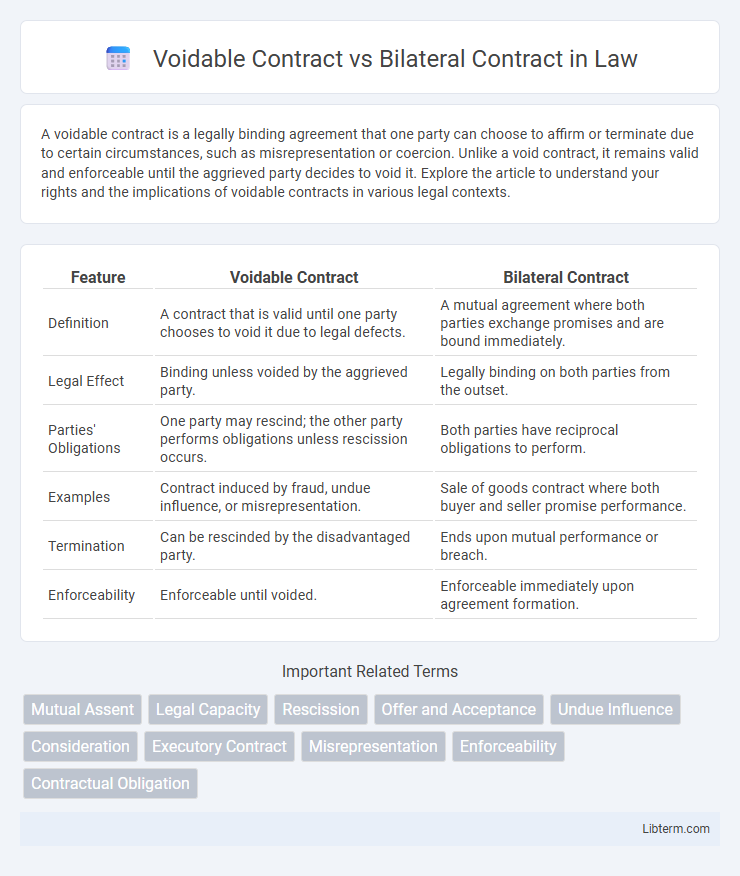A voidable contract is a legally binding agreement that one party can choose to affirm or terminate due to certain circumstances, such as misrepresentation or coercion. Unlike a void contract, it remains valid and enforceable until the aggrieved party decides to void it. Explore the article to understand your rights and the implications of voidable contracts in various legal contexts.
Table of Comparison
| Feature | Voidable Contract | Bilateral Contract |
|---|---|---|
| Definition | A contract that is valid until one party chooses to void it due to legal defects. | A mutual agreement where both parties exchange promises and are bound immediately. |
| Legal Effect | Binding unless voided by the aggrieved party. | Legally binding on both parties from the outset. |
| Parties' Obligations | One party may rescind; the other party performs obligations unless rescission occurs. | Both parties have reciprocal obligations to perform. |
| Examples | Contract induced by fraud, undue influence, or misrepresentation. | Sale of goods contract where both buyer and seller promise performance. |
| Termination | Can be rescinded by the disadvantaged party. | Ends upon mutual performance or breach. |
| Enforceability | Enforceable until voided. | Enforceable immediately upon agreement formation. |
Introduction to Voidable and Bilateral Contracts
Voidable contracts are agreements where one party holds the right to either enforce or rescind the contract due to factors like misrepresentation, coercion, or undue influence, making such contracts valid until voided. Bilateral contracts involve mutual promises exchanged between two parties, creating obligations on both sides to perform specific actions or deliver goods and services. Understanding the distinction highlights that voidable contracts address vulnerabilities in consent, while bilateral contracts emphasize reciprocal commitments.
Definition of Voidable Contract
A voidable contract is a legally binding agreement that one party may legally cancel or enforce due to factors like misrepresentation, coercion, or undue influence, while the other party remains bound unless the contract is rescinded. It differs from a bilateral contract, which involves mutual obligations where both parties make promises and are bound to perform. Understanding the voidable nature ensures protection against unfair agreements while maintaining enforcement of valid bilateral contracts.
Definition of Bilateral Contract
A bilateral contract is a legally binding agreement where both parties exchange mutual promises to perform specific obligations, creating reciprocal rights and duties. In contrast, a voidable contract is valid but can be annulled by one party due to factors such as misrepresentation, duress, or incapacity, affecting its enforceability. Understanding that bilateral contracts require mutual consent and offer enforceable commitments distinguishes them from voidable agreements that may be voided under certain conditions.
Key Differences Between Voidable and Bilateral Contracts
Voidable contracts grant one party the option to enforce or rescind the agreement due to factors like misrepresentation or coercion, whereas bilateral contracts involve mutual promises where both parties are bound to perform their obligations. The enforceability of a voidable contract depends on the injured party's decision, while bilateral contracts are inherently valid and enforceable upon agreement. Key differences also include that voidable contracts may become void if rescinded, but bilateral contracts create immediate and reciprocal legal duties for both parties.
Essential Elements of Voidable Contracts
Voidable contracts contain essential elements such as mutual assent, consideration, and capacity, but include one party's ability to rescind due to factors like misrepresentation, coercion, or undue influence. Unlike bilateral contracts where mutual promises create binding obligations, voidable contracts remain valid until the injured party decides to void them. This distinction hinges on the presence of a defect in consent that affects the enforceability of the contract.
Essential Elements of Bilateral Contracts
A bilateral contract requires mutual consent, offer, acceptance, and consideration from both parties, establishing clear obligations for each. In contrast, a voidable contract is valid and enforceable until one party chooses to rescind due to factors like misrepresentation or undue influence. The essential elements of bilateral contracts ensure a binding agreement with legal intent, capacity, and lawful purpose, differentiating them from contracts that may be voided under certain conditions.
Legal Implications and Enforceability
Voidable contracts grant one party the option to either rescind or enforce the agreement due to defects like misrepresentation, fraud, or undue influence, impacting their legal enforceability. Bilateral contracts involve mutual promises between two parties, creating reciprocal obligations that are legally binding once both parties consent. The enforceability of bilateral contracts is typically straightforward, whereas voidable contracts require judicial intervention to confirm the validity based on the circumstances surrounding contract formation.
Examples of Voidable and Bilateral Contracts
A voidable contract example includes a contract signed under duress, like a person forced to sell property under threat, which can be legally annulled by the coerced party. A typical bilateral contract example is a sales agreement where both parties exchange promises, such as a buyer agreeing to pay a seller for goods by a specified date. In voidable contracts, one party maintains the option to cancel the agreement, while bilateral contracts involve mutual obligations legally binding both parties.
Common Scenarios and Case Studies
Voidable contracts often arise in scenarios involving minors, duress, or misrepresentation, where one party retains the option to affirm or void the agreement. Bilateral contracts, exemplified by mutual promises in sales or service agreements, entail reciprocal obligations enforceable upon acceptance by both parties. Case studies such as *Raffles v. Wichelhaus* highlight the enforceability issues in bilateral contracts, while *Dodson v. Shrader* illustrates the voidable nature when minors enter agreements.
Conclusion: Choosing the Right Contract Type
Selecting between a voidable contract and a bilateral contract depends on the desired level of enforceability and mutual obligation. A voidable contract offers protection by allowing one party to rescind under specific circumstances such as fraud or duress, whereas a bilateral contract ensures mutual promises binding both parties from the outset. Businesses must assess the risk factors and contractual goals to determine the most suitable contract type for their transaction.
Voidable Contract Infographic

 libterm.com
libterm.com